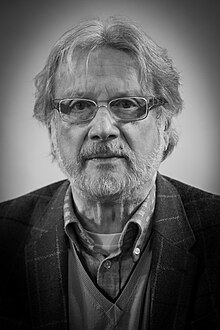Daniel Defert (10 September 1937 – 7 February 2023) was a French sociologist and HIV/AIDS activist. Partner to the late Michel Foucault, Defert co-founded France's first AIDS advocacy group, AIDES, following Foucault's death from complications related to the disease. Defert was the heir to Foucault's estate.
Daniel Defert | |
|---|---|
 Defert in 2015 | |
| Born | 10 September 1937 |
| Died | 7 February 2023 (aged 85) Paris, France |
| Alma mater | École normale supérieure de Saint-Cloud |
| Occupation | Sociologist |
| Partner | Michel Foucault |
Early life
editDaniel Defert was born on 10 September 1937. He graduated from the École normale supérieure de Saint-Cloud. He earned the agrégation in philosophy.[1] Defert met Foucault while he was a philosophy student at the University of Clermont-Ferrand in France and their relationship lasted from 1963 until Foucault's death in 1984.[citation needed]
Early academic career
editA professor of sociology, Daniel Defert was assistant (1969–1970), maître-assistant (1971–1985), then maître de conférence (from 1985) at the Centre Universitaire of Vincennes, which became in 1972 Université Paris VIII Vincennes.[2]
AIDS research and activism
editAfter the death of his partner Michel Foucault from complications related to AIDS, Defert founded AIDES, the first AIDS awareness organization in France.[1][3] The name invokes the French word for "help" as well as the English acronym for the disease (the French acronym is SIDA). Defert served as president of AIDES from 1984 to 1991.[1]
Defert was a member of the scientific committee for human sciences of the International Conference on AIDS (1986–94); member of the World Commission for AIDS (World Health Organization) (1988–93); member of the National Committee for AIDS (1989–98), of the Global AIDS Policy Coalition of Harvard University (1994–1997), and of the French Haut Comité de la Santé Publique (from 1998).[citation needed]
Defert was the author of numerous articles in the domain of ethno-iconography and public health.[4] He was awarded the decoration of Chevalier de la Légion d’Honneur[5] and received the Alexander Onassis prize for the creation of AIDES in 1998.[6]
Foucault estate
editAfter Foucault's death, Defert inherited his estate despite the fact that their partnership preceded French government recognition of gay couples through civil unions (1999) or marriage (2013)[7] and Foucault left no official will; however Foucault had written a letter indicating his intention to bequeath his apartment and all its contents, which included his archive and corrected proofs for an unpublished manuscript, to Defert.[8] Other family members deferred to Foucault's wishes, but without government recognition, Defert, like other surviving partners in a similar position, was still subject to much higher inheritance taxes than he would have been as a recognized family member.[7]
Defert co-edited, with François Ewald, volume 4 of Dits et Ecrits of Michel Foucault (1994), a posthumous collection of Foucault's writing.[citation needed]
In 2013, Defert sold for €3.8m ($4.0m, May 2022)[9] Foucault's archives to France's national library, making the material available to researchers; subsequently the family, which owns the literary rights, elected to publish the manuscript (Confessions of the Flesh, 2018, the fourth and final volume of Foucault's History of Sexuality), despite Foucault's instruction that no work be published posthumously.[8] Defert explained the decision that after the material became available to researchers with the credentials to acquire a reader card at the national library,[8] Defert and others close to Foucault felt that access should be either available "to everyone or no one".[7] Additionally, many previous posthumous works had already been published,[10] and Defert felt this new addition did not make any encroachment on Foucault's intimate life, but strictly contributed to the corpus of his intellectual contributions;[7] by contrast, the letters exchanged between the two of them, Defert said in 2012, he intended to "take to his grave."[7]
Death
editDefert died in Paris on 7 February 2023, at the age of 85.[11]
References
edit- ^ a b c Delaporte, Michel (19 September 2014). "" Quand on questionne les marges, on arrive au cœur de la politique " Daniel Defert". L'Humanité. Retrieved 11 August 2016.
- ^ "DANIEL DEFERT". WELCOME TO UPRISING 13/13. Retrieved 3 March 2018.
- ^ "La création d'Aides". 16 February 2023.
- ^ Işıl Baş, Donald Cary Freeman (eds.), Challenging the Boundaries, Rodopi, 2007, p. x.
- ^ "Mort de Daniel Defert : nous poursuivrons sa lutte contre le VIH/sida". Têtu (in French). Retrieved 7 February 2023.
- ^ "POTENTIAL NOBEL PURSUITS - UPI Archives". UPI. 27 May 1988. Retrieved 7 February 2023.
- ^ a b c d e Aeschimann, Eric; Monnin, Isabelle (26 November 2012). "Daniel Defert : "Les archives de Foucault ont une histoire politique"". Le Nouvel Observateur. Retrieved 11 August 2016.
- ^ a b c Libbey, Peter (8 February 2018). "Michel Foucault's Unfinished Book Published in France". The New York Times. ISSN 0362-4331. Retrieved 6 April 2018.
- ^ "Archives à vendre ou à laisser". Le Monde.fr. 20 December 2012.
- ^ Flood, Alison (12 February 2018). "'Key' fourth book of Foucault's History of Sexuality published in France". The Guardian. Retrieved 6 April 2018.
- ^ "Daniel Defert, philosophe, sociologue et figure de la lutte contre le sida, est mort". Le Monde.fr (in French). 7 February 2023. Retrieved 7 February 2023.